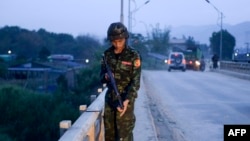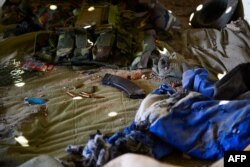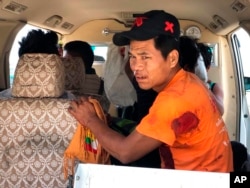New fighting broke out Monday along the border between Myanmar and China, as the United States and China urged restraint. The latest violence erupted near the area where 32 people were killed in fighting over the weekend.
The fighting continued most of the day in Ho-Mong village, a police officer from the Nam-phaka station told VOA Burmese. "Clashes began around 9 a.m. in Muse's Namohn and Nampauh areas, when around 100 to 150 [rebels] entered to the Ho-mong village," the police officer said.
The fighters from the Northern Alliance, a coalition of four armed ethnic groups, encountered Myanmar military troops in the village between Nam-phaka and Muse, and the subsequent fighting continued into the afternoon, according to the officer. Muse was the scene of Saturday's violence, where the dead included two Chinese citizens.
Muse Relief volunteer U Thaung Tun told VOA that the Nampawh Bridge near Muse was targeted by heavy weaponry Monday.
Despite the clashes, at least 3,000 trucks continued their daily route at the busy Muse border crossing between Myanmar's Shan state and China's Yunnan Province, according to the volunteer.
Yangon's U.S. Embassy Press Officer Aryani Manring told VOA, "We are deeply concerned by the casualties caused by recent clashes between the Ta'ang National Liberation Army, government security forces, and militias in Muse township in northern Shan state, and express our heartfelt sympathy to the families of those killed and injured in the conflict.
"We urge all relevant parties to exercise restraint in protecting the civilian population from further casualties, to allow humanitarian aid to reach all communities affected by conflict, and to negotiate for peaceful solutions to the problems that have plagued this nation for decades," Manring continued. "We stand ready to support such efforts."
Also Monday, China issued a statement saying that the clashes seriously undermined peace on the China-Myanmar border. During the daily press briefing Monday at the Chinese Foreign Ministry, spokesman Lu Kang told reporters, "China demands the parties to the conflict stop the firing immediately, take all measures to prevent further escalation of the situation ... and prevent incidents that sabotage the peace and stability in the China-Myanmar border region," according to an Associated Press transcript of the briefing.
Lu was referring to the rockets and stray bullets that fell on Chinese territory Saturday, followed by more than 300 refugees who fled to China after the violence.
The Ta'ang National Liberation Army (TNLA) launched the operation Saturday. The group belongs to the Northern Alliance, which describes itself on its website as "an ethnic revolutionary armies group comprising of the Kachin Independence Army (KIA), Myanmar National Democratic Alliance Army (MNDAA), … and the Arakan Army (AA), which is fighting for the rights of national self-determination, equal political rights, people's rights, peace and social justice."
The goal of the alliance is to "establish a genuine federal democratic union of Myanmar where a constitutional guarantee for a certain degree of autonomy for non-Burman ethnic peoples will be provided. We always call for a genuine political dialogue to settle almost 70 years of ethnic conflict and civil war in Myanmar."
The initial attack began early Saturday on the outskirts of Muse in Shan State and continued for about three hours, Sai Kyaw Thein, a member of parliament from Muse, told The New York Times.
The TNLA claimed responsibility for the attack. The group said in a statement that it was retaliating for a push by Myanmar's military against another ethnic insurgent group, the KIA.
A TNLA spokesman said it had targeted soldiers and militia members who ran a casino.
"Many civilians go to casinos and it causes many social problems; that's why we launched a major assault," the spokesman, Colonel Tar Aik Kyaw, told the Times. He called the casino a "gateway for distributing drugs."
This report originated with VOA Burmese.






